
Chumbawamba were a British anarchist punk band formed in 1982 and disbanded in 2012. They are best known for their 1997 single "Tubthumping", which was nominated for Best British Single at the 1998 Brit Awards. Other singles include "Amnesia", "Enough Is Enough", "Timebomb", "Top of the World ", and "Add Me". The band drew on genres such as punk rock, pop, and folk. Their anarcho-communist political leanings led them to have an irreverent attitude toward authority, and to espouse a variety of political and social causes including animal rights and pacifism and later regarding class struggle, Marxism, feminism, gay liberation, pop culture, and anti-fascism.

"Wifey" is a song by American R&B trio Next. The song was written by Eddie Berkeley, Keir Gist, band member Robert "RL" Huggar, and singer Lil' Mo for the group's second studio album, Welcome II Nextasy (2000). The song was released as the album's lead single on May 8, 2000. "Wifey" peaked at number one on the US Billboard Hot R&B/Hip-Hop Singles & Tracks chart while reaching number seven on the Billboard Hot 100. It also entered the top 20 in New Zealand and the United Kingdom. In 2001, the song won an AWARD Rhythm & Soul Award for in the Award-Winning R&B/Hip-Hop Songs category.
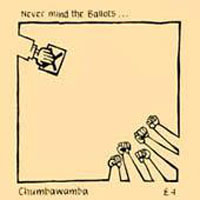
Never Mind the Ballots is the second studio album by anarchist punk band Chumbawamba. Most of the songs center on lying politicians and their search for more voter control. It was originally released on cassette and LP, then re-released in the 1990s as half of the Chumbawamba compilation CD First 2, which is a combination of their first two LP albums released on a single CD.

"Tubthumping" is a song released by British rock band Chumbawamba from their eighth studio album, Tubthumper (1997). It is the band's most successful single, peaking at number two on the UK Singles Chart. It topped the charts in Australia, Canada, Ireland, Italy, New Zealand and hit number six on the US Billboard Hot 100. At the 1998 Brit Awards, "Tubthumping" was nominated for the Brit Award for Best British Single. It sold 880,000 copies in the UK.
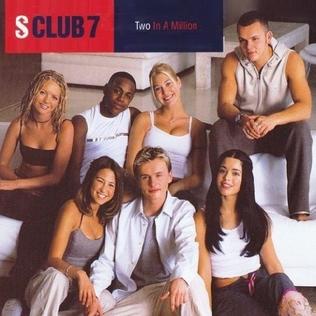
"Two in a Million" is a song by British pop group S Club 7, released as the third single from their debut studio album, S Club (1999), on 13 December 1999. The single was released as a double A-side with "You're My Number One" in UK, but in other countries, it was issued as a stand-alone single. The single debuted at number five on the UK Singles Chart and peaked at number two in January 2000. In New Zealand, "Two in a Million" became the band's third consecutive number-one single, after "Bring It All Back" and "S Club Party".
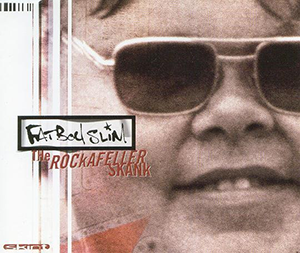
"The Rockafeller Skank", often referred to as "Funk Soul Brother" by fans, is a song by English big beat musician and DJ Fatboy Slim. It was released as the lead single from his second studio album, You've Come a Long Way, Baby (1998), on 8 June 1998. The single peaked at number six on the UK Singles Chart in June 1998 and topped the Icelandic Singles Chart for a week the same month. It was the second Fatboy Slim single to chart on the US Billboard Hot 100, peaking at number 76. In 2022, Rolling Stone ranked "The Rockafeller Skank" at number 199 on their list of the "200 Greatest Dance Songs of All Time".

Tubthumper is the eighth studio album and the major label debut by English rock band Chumbawamba, released on 1 September 1997 by EMI. The album was written and produced by Chumbawamba, with additional production from Neil Ferguson. A musical departure from the group's anarcho-punk roots, the album incorporates elements of pop rock, dance-pop, and alternative rock. Thematically, the album acts as a social commentary on a variety of political issues, particularly that of class conflict. Tubthumper was promoted with three singles: "Tubthumping", "Amnesia", and "Drip, Drip, Drip". "Top of the World ", a standalone single previously featured on the official music compilation album for the 1998 FIFA World Cup, was included on a European reissue of Tubthumper.

"Bohemian Like You" is a song by American alternative rock band the Dandy Warhols. The song was written by frontman Courtney Taylor-Taylor after seeing a woman pull up in her car to the traffic lights outside his apartment. It was released as the second single from the band's third studio album, Thirteen Tales from Urban Bohemia, on July 11, 2000.

Swingin' with Raymond is the seventh studio album by anarchist punk band Chumbawamba. The album cover features a photograph of Raymond Mills.

WYSIWYG is the ninth studio album by English rock band Chumbawamba, released on 4 April 2000 by EMI. The album was written and produced by Chumbawamba, with additional production by Neil Ferguson. Originally a continuation of the sound of predecessor Tubthumper (1997), the group scrapped the material from the album's initial recording sessions and sought to explore new sounds with WYSIWYG. The album incorporates elements of pop, dance-pop, alternative rock, and experimental music. Thematically, the album explores various aspects of pop culture that the group had been exposed to due to the success of their 1997 single "Tubthumping". WYSIWYG was promoted with one single: "She's Got All the Friends That Money Can Buy".
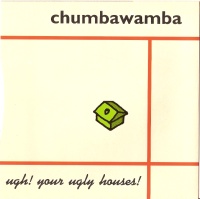
"Ugh! Your Ugly Houses!" is a song by Chumbawamba. Released in 1995, it served as the lead single from the group's seventh studio album, Swingin' with Raymond. It was later featured on the group's 1999 compilation, Uneasy Listening. The song criticizes the homes featured in celebrity gossip magazines such as Hello. Upon its release, the song attained modest chart success in the United Kingdom, where it became their fourth chart entry, spending one week in the top 100. It was generally well-received by critics, who praised its humorous lyrics and composition.

"Homophobia" is a song by English rock band Chumbawamba from their sixth studio album Anarchy (1994). A remixed version of the song featuring the Sisters of Perpetual Indulgence, titled the "Sisters Mix" was released as the third single from the album in 1994. Concerning the topic of modern homophobia, the song remained a regular part of Chumbawamba's live set from its initial release in 1994 up to the band's retirement in 2012. Live recordings of the song are featured on Chumbawamba's two live albums Showbusiness! and Get On with It.

"(Someone's Always Telling You How To) Behave" is a song by British rock group Chumbawamba. The song, which incorporates elements of rock and dance, criticizes homophobia in pop and rock music. The group recorded it in late summer 1992 but struggled to reach an agreement with their distributor, Southern Records, over the song's quality, release formats, and promotional budget. The band ultimately opted to form their own label, Agit Prop Records, to oversee the single's release.
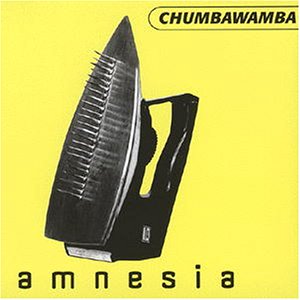
"Amnesia" is the second single from English rock band Chumbawamba's eighth studio album, Tubthumper (1997). The song's lyrics address the sense of betrayal that English leftists felt during the rise of New Labour. Released on 19 January 1998 by EMI, the song was met with favorable reception from critics, who regarded the song as a highlight from Tubthumper.

"She's Got All the Friends That Money Can Buy" is the first single released from Chumbawamba's album WYSIWYG. The song's lyrics describe a wealthy socialite who's benefited from her parents' wealth. Upon its release, the song received mixed reviews from critics and was generally unsuccessful, failing to enter the UK Singles Chart or the Billboard Hot 100 and receiving very little airplay. The song's B-side, "Passenger List for Doomed Flight #1721", was subject to controversy upon its release, due to its lyrics' criticism of a number of prominent social figures.

"Jacob's Ladder (Not in My Name)" is a song by English rock band Chumbawamba. An earlier version of the song, criticizing Winston Churchill, was included on their 2002 studio album Readymades, but in response to the incipient Iraq War, the group rewrote the song as a broader criticism of war. It has been described as an anti-war song, and incorporates folk influences as well as sampling.

"Gate (Sore wa Akatsuki no you ni)" (Japanese: GATE (それは暁のように);, "Gate (It Looks Like the Dawn)") is a song recorded by Japanese rock Kisida Kyoudan & The Akebosi Rockets. It was released as the group's first single in two years by Warner Bros. Entertainment and their subsidiary label Warner Home Video on July 29, 2015. The lyrics were written by Kisida and the music and arrangement were created by the band. Musically, "Gate (Sore wa Akatsuki no you ni)" is a rock song that features guitars, drums, and bass guitars in its instrumentation. An alternative version with different lyrics and slightly edited composition was released in January 2016, under the title "Gate II (Sekai wo Koete)".


















